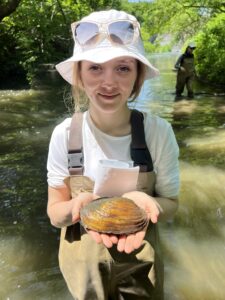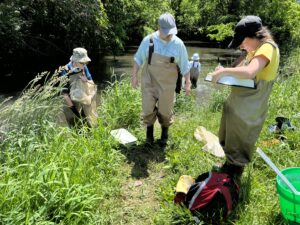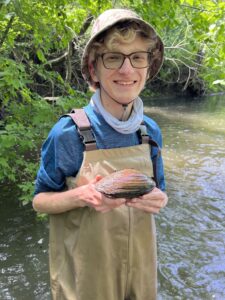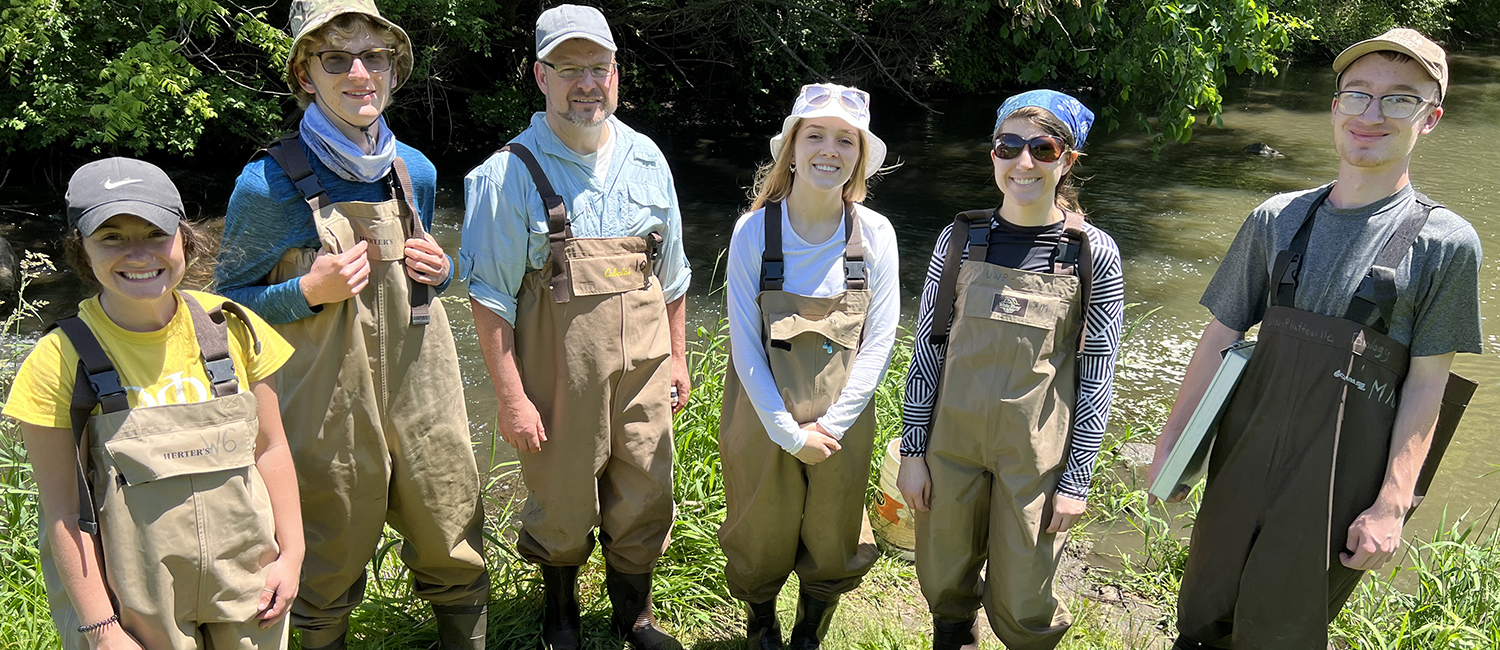In summer 2022, students from UW-Platteville participated in research through “Collaborating to Protect and Monitor Streams in an Agricultural Landscape,” a grant funded by the Freshwater Collaborative of Wisconsin. The project was a cooperative effort among UW-Platteville faculty, undergraduate students, the Harry and Laura Nohr Chapter of Trout Unlimited and the Wisconsin Department of Natural Resources to collect data on stream communities and habitats in agriculture-based watersheds of southwest Wisconsin.
For more about the project, read UW-Platteville Student Researchers Support WDNR, Trout Unlimited Conservation Efforts.
Here’s what student researchers said about their experience. (This interview has been edited for clarity and length.)
Chloe Mellody: biology major with zoology or ecology emphasis
Lindsey Ockerlander: criminal justice and biology double major
Myah Sierens: biology major with ecology emphasis, environmental minor, GIS certificate
Tyler Vargo: broad field science major
Tell us about the project.
Ockerlander: The first part of summer we were working with Trout Unlimited. We went to sites to gather fish and habitat measurements. Some sites may not have been actively measured since 2011 and 2015, while others were being more regularly measured. Our duties consisted of habitat measurement and taking notes on substrate, erosion and tree coverage. We went into the river and used samplers to collect invertebrates to identify in the lab later. We also did fish shocking where we measured the approximate number of fish in an area and took notes on species and length.
Mellody: For the second part of the research, we scouted sites for mussels, their presence, their size and their species [for the Wisconsin DNR]. We found about eight to nine different live species and gauged the diversity of the population and the health of the streams.

What skills did you learn?
Ockerlander: We were trained by Kristopher Wright and Rebecca Doyle-Morin, our professors, who have been working on these projects for years. We learned how to fish shock. We learned how to measure fish. We had to take a certification course before going into this project to make sure that we were able to properly handle fish. We also had a general certification to make sure that we were ready to deal with living animals in the field and to make sure we weren’t disrupting the ecology.
Mellody: One of the most important things for me was learning how to do formal surveying when it comes to habitat and invertebrates. I really love fish so the most useful skills I learned were fish identification, how to handle fish and how to find fish in an environment. And the other skills were teamwork and communications, which are really important things you need in a research team.
Vargo: During my time on the stream team, I learned a lot about our local habitats and species here in southwest Wisconsin, and I gained a lot of valuable research skills, but I think the most important thing I gained was learning the value of teamwork while doing field research and taking advantage of every team member’s strengths.
What was your favorite part?
Sierens: One of my favorite parts of the summer was electroshocking fish because you see this small stream and you don’t think there are massive fish in there. But then you’ve got these massive white suckers and so many different types of fish. I thought that was really cool. Being able to be outside in a stream and in beautiful environments was super refreshing compared to other summer jobs I’ve had.
Mellody: My favorite part was also the shocking for the exact same reason. It’s just awesome to see the diversity of fish in such a small stream. You never think there will be a 12-inch fish in a five-foot wide stream.
Vargo: My favorite part of the project was definitely going out pollywogging, where we would trudge through muddy streams all day in search of mussels. It wasn’t very pretty work, but the team we had made it worth it, and eventually finding mussels was always exciting. I remember the first time we found a new mussel site in the field, and everyone went crazy. It was one of my best memories from the summer.
What would you tell other students who are considering field work?
Ockerlander: I definitely recommend field work to students, even those who aren’t interested in going into a field position because you do so much. We were comparing data. There was lab work identifying invertebrates. We did a huge mussel relocation in La Crosse, and we were able to talk with scientists there. We did library outreach, so we were helping with children and had to learn how to communicate the science to them. There were a lot of good experiences if you are going into any biology field.
Mellody: It’s not just about learning about ecology and streams in the middle of Wisconsin. It’s also learning about teamwork. For me, I learned how to use a map, which I’d never used before. I think the best thing for students, even those who aren’t going into field work, are all the skills that you learn and the people you meet.
Sierens: The only thing I would add is just being able to meet different people with different interests. It’s been a good experience to be able to work on communication and learning cooperation within a team.

How will participating in this research project help you attain your career goals?
Sierens: I hope to do something in the realm of field biology. I’ve been looking at all the possible pathways I could take. Going into this summer, I was excited just to be doing something within biology in general. This project opened more doors because it increased my appreciation for mussels or fish. Being able to work with them closely and see their environment and study them has really opened my eyes to opportunities.
Mellody: I had no idea it was such an open field. There are just so many career options.
Ockerlander: I have a job already lined up with Prevention Genetics in Marshfield, Wis. I secured the job last summer. They were looking for new employees because they will be expanding. One of my future coworkers was an ecology major, and it was nice being able to talk with her about what was going on with this project and what I will soon be doing in an oncology genetics lab. It seems very different, but it was very interesting to see what the overlap will be and to have that connection with somebody who did basically the same thing that I did over the summer.

Vargo: Originally, I was planning on teaching science in a high school setting, but now I’ve shifted toward being in the field more. I still want to educate others, but I want to spend more of my time outdoors, studying nature, and working with a team to discover new things. The research project I was a part of has already helped me discover new career paths that I didn’t even know existed before, and it has shown me what truly makes me happy when considering a career. It also gave me skills that I can translate to future tasks and opportunities when working with others. Not to mention that I can add pollywogging as a skill to boost my resume!

